|
|
|
Sort Order |
|
|
|
Items / Page
|
|
|
|
|
|
|
| Srl | Item |
| 1 |
ID:
100789
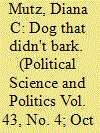

|
|
|
|
|
| Publication |
2010.
|
| Summary/Abstract |
Using the most extensive dataset available on the 2008 election, I examine the impact of dog ownership on presidential vote preference. Canines were elevated to the status of a campaign issue when, during the 2008 campaign, Barack Obama publicly promised his daughters a dog after the election was over, a campaign promise that has since been fulfilled. However, this announcement appears to have unintentionally highlighted the absence of a key point of potential identification between this candidate and voters, and thus to have significantly undermined the likelihood that dog-owning voters would support Obama. I elaborate upon the implications of this finding for future presidential candidates.
|
|
|
|
|
|
|
|
|
|
|
|
|
|
|
|
| 2 |
ID:
121026
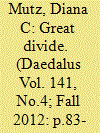

|
|
|
|
|
| Publication |
2012.
|
| Summary/Abstract |
There is a huge difference between public perceptions of the power of media in elections and academic evidence of its influence. This gap stems from the fact that the public uses different forms of evidence than academics use to infer media power. This essay outlines the reasons for this great divide, then highlights the seriousness of its consequences for the allocation of political resources. Public beliefs in omnipotent media contribute to wasted time and money; ultimately, they undermine the legitimacy of election outcomes.
|
|
|
|
|
|
|
|
|
|
|
|
|
|
|
|
| 3 |
ID:
149338


|
|
|
|
|
| Summary/Abstract |
Few empirical studies suggest that fictional stories can influence political opinions. Nonetheless, in this study I demonstrate the relevance of Harry Potter consumption to oppositional attitudes toward Donald Trump and his worldview. Using multivariate observational models and panel data from 2014 to 2016, results suggest that the lessons of the Harry Potter series have influenced levels of opposition to punitive policies and support for tolerance of groups considered outside the American mainstream. Further, they predict public reactions to Donald Trump above and beyond their influence on policies consistent with his views.
|
|
|
|
|
|
|
|
|
|
|
|
|
|
|
|
| 4 |
ID:
175285


|
|
|
|
|
| Summary/Abstract |
When forming opinions, mass publics may implicitly or explicitly value some people’s well-being more than others. Here we examine how two forms of this phenomenon—ethnocentric valuation and moral exclusion—affect attitudes toward international trade. We hypothesize that attitudes toward competition and believing that trade is a competition moderate the extent of ethnocentric valuation and moral exclusion; although all citizens value their co-nationals’ livelihoods systematically more than those of people in trading partner countries, greater ethnocentric valuation and moral exclusion occur when trade is seen as a competition and when individuals hold more positive attitudes toward competition.
|
|
|
|
|
|
|
|
|
|
|
|
|
|
|
|
| 5 |
ID:
156714
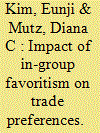

|
|
|
|
|
| Summary/Abstract |
Using a population-based survey experiment, this study evaluates the role of in-group favoritism in influencing American attitudes toward international trade. By systematically altering which countries gain or lose from a given trade policy (Americans and/or people in trading partner countries), we vary the role that in-group favoritism should play in influencing preferences.
Our results provide evidence of two distinct forms of in-group favoritism. The first, and least surprising, is that Americans value the well-being of other Americans more than that of people outside their own country. Rather than maximize total gains, Americans choose policies that maximize in-group well-being. This tendency is exacerbated by a sense of national superiority; Americans favor their national in-group to a greater extent if they perceive Americans to be more deserving.
Second, high levels of perceived intergroup competition lead some Americans to prefer trade policies that benefit the in-group and hurt the out-group over policies that help both their own country and the trading partner country. For a policy to elicit support, it is important not only that the US benefits, but also that the trading partner country loses so that the US achieves a greater relative advantage. We discuss the implications of these findings for understanding bipartisan public opposition to trade.
|
|
|
|
|
|
|
|
|
|
|
|
|
|
|
|
| 6 |
ID:
139531
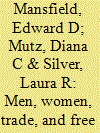

|
|
|
|
|
| Summary/Abstract |
In this paper, we provide one of the first systematic analyses of gender's effect on trade attitudes. We draw on a unique representative national survey of American workers that allows us to evaluate a variety of potential explanations for gender differences in attitudes toward free trade and open markets more generally. We find that existing explanations for the gender gap, most notably differences between men and women in economic knowledge and differing material self-interests, do not explain the gap. Rather, the gender difference in trade preferences and attitudes about open markets is due to less favorable attitudes toward competition among women, less willingness to relocate for jobs among women, and more isolationist non-economic foreign policy attitudes among women.
|
|
|
|
|
|
|
|
|
|
|
|
|
|
|
|
| 7 |
ID:
162855


|
|
|
|
|
| Summary/Abstract |
Are liberals truly more likely to drink lattes than conservatives? In this study, we first use a representative national survey to address this unanswered question. On confirmation, we examine three hypotheses about why this relationship exists. Our results led to a fundamental reinterpretation of what it means to be a “latte liberal.”
|
|
|
|
|
|
|
|
|
|
|
|
|
|
|
|
| 8 |
ID:
090609
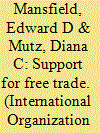

|
|
|
| 9 |
ID:
124865
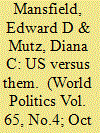

|
|
|
|
|
| Publication |
2013.
|
| Summary/Abstract |
Economists have argued that outsourcing is another form of international trade. However, based on a representative national survey of Americans conducted in 2007 and 2009, the distribution of preferences on these two issues appears to be quite different. This article examines the origins of attitudes toward outsourcing, focusing on the extent to which it reflects (1) the economic vulnerabilities of individuals; (2) the information they receive about outsourcing, including their subjective understanding of what constitutes outsourcing; and (3) noneconomic attitudes toward foreign people and foreign countries. The findings emphasize the importance of variations in understandings of the term, as well as the highly symbolic nature of attitudes toward this issue. Individuals who believe the US should distance itself from international affairs more generally, who are nationalistic, or who feel that members of other ethnic and racial groups within the US are less praiseworthy than their own group tend to have particularly hostile reactions to outsourcing. The informational cues people receive are also important influences on their understanding of and attitudes toward outsourcing. Experimental results further emphasize the symbolic nature of attitudes toward outsourcing. Taken together, the results strongly suggest that attitudes are shaped less by the economic consequences of outsourcing than by a sense of "us" versus "them."
|
|
|
|
|
|
|
|
|
|
|
|
|
|
|
|
|
|
|
|
|